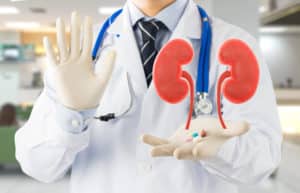Urologic Health is a Priority
 Here at UT Urology, we think about urologic health on a daily basis. Our patients usually do not, at least they didn’t until they were told by their primary care doctor that they should see a urologist. Until that type of recommendation is made, the average person usually doesn’t even know what a urologist does, let alone what they can do personally to improve their urologic health. We’ll touch on both here.
Here at UT Urology, we think about urologic health on a daily basis. Our patients usually do not, at least they didn’t until they were told by their primary care doctor that they should see a urologist. Until that type of recommendation is made, the average person usually doesn’t even know what a urologist does, let alone what they can do personally to improve their urologic health. We’ll touch on both here.
Protecting Your Urologic Health
Urologic health is taking care of the urinary tract. This internal part of the body doesn’t receive the same type of care as other areas like the skin and the teeth. Because the urinary tract is all internal, we often don’t consider how what we do and don’t do could affect it. Some of the ways to be mindful of prioritizing urologic health include:
- Drinking plenty of water
- Eating a balanced diet
- Maintaining a healthy weight
- Getting regular exercise
- Refraining from smoking (It is a contributing factor for bladder cancer)
In addition to following these general rules for health and wellness, it is possible to prioritize urologic health by limiting sodium intake. Salt and sodium are factors in fluid retention. When the body retains water, the mineral/water balance in the kidneys may be disrupted. Caffeine, as well, may affect the urinary tract. In this instance, it is because caffeine is a diuretic and can lead to bladder irritation.
According to the Urology Care Foundation, urologic health is also promoted by using good bathroom habits. The foundation advises people to take their time when using the bathroom, allowing their bladder to empty fully so as to decrease the risk of infection. Finally, we should not shy away from talking about our urologic health. If symptoms occur that are out of the ordinary, they should not be ignored. A urologist can provide care that reduces or eliminates symptoms altogether.
Signs That You Should Visit Your Urologist
Telltale signs that you should see a urologist include:
- Pain when urinating
- Blood in the urine
- Inability to urinate
- Significant changes in urinary patterns
- Incontinence
- Frequent urinary tract infections
- Lower abdominal pain
- Erectile dysfunction
- Male impotence
- Male infertility
- Testicular pain
The team at UT Urology specializes in the diagnosis and treatment of a wide variety of pediatric and adult urologic conditions. Contact us today to schedule your consultation.

 We expect our various organs to perform well from day to day. For the most part, they do, though they may surprise us from time to time with unexplained symptoms. With age, many men come to realize that they may live with occasional difficulty
We expect our various organs to perform well from day to day. For the most part, they do, though they may surprise us from time to time with unexplained symptoms. With age, many men come to realize that they may live with occasional difficulty  When choosing a healthcare provider, there are certain qualifications one looks for. In the general setting in which a doctor will be chosen to perform
When choosing a healthcare provider, there are certain qualifications one looks for. In the general setting in which a doctor will be chosen to perform 